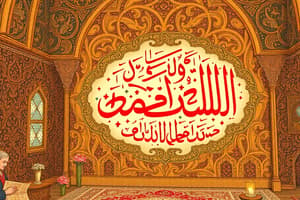Podcast
Questions and Answers
ما هي اللغة التي تستخدم الأبجدية العربية وتكتب من اليمين إلى اليسار؟
ما هي اللغة التي تستخدم الأبجدية العربية وتكتب من اليمين إلى اليسار؟
- السنسكريتية
- الفرنسية
- الهندية
- الأردية (correct)
أي من الخيارات التالية يعبر عن تأثيرات اللغة الأردية؟
أي من الخيارات التالية يعبر عن تأثيرات اللغة الأردية؟
- تأثيرات فرنسية
- تأثيرات فارسية وعربية (correct)
- تأثيرات إنجليزية
- تأثيرات روسية
أي من هذه الصيغ الأدبية تُعتبر جزءًا من الأدب الأردي؟
أي من هذه الصيغ الأدبية تُعتبر جزءًا من الأدب الأردي؟
- غزل (correct)
- ملحمة
- قصيدة غنائية
- رواية تاريخية
أي من الأدباء التالية أسماءهم يعتبرون من الشعراء البارزين في اللغة الأردية؟
أي من الأدباء التالية أسماءهم يعتبرون من الشعراء البارزين في اللغة الأردية؟
ما هو الاختلاف الرئيسي بين الأردية والهندية؟
ما هو الاختلاف الرئيسي بين الأردية والهندية؟
ما هو الشكل الشعري المكون من أربع أسطر في الأدب الأردي؟
ما هو الشكل الشعري المكون من أربع أسطر في الأدب الأردي؟
ما هو التأثير الثقافي للغة الأردية في باكستان والهند؟
ما هو التأثير الثقافي للغة الأردية في باكستان والهند؟
ما هو العنصر الذي يميز الأبجدية الأردية مقارنة ببعض اللغات الأخرى؟
ما هو العنصر الذي يميز الأبجدية الأردية مقارنة ببعض اللغات الأخرى؟
Flashcards
Urdu language
Urdu language
An Indo-Aryan language, primarily spoken in Pakistan and India, with a significant influence from Persian and Arabic.
Writing script of Urdu
Writing script of Urdu
The Perso-Arabic script, written right-to-left.
Urdu vocabulary
Urdu vocabulary
Strongly influenced by Persian and Arabic words.
Urdu and Hindi
Urdu and Hindi
Signup and view all the flashcards
Urdu literary forms
Urdu literary forms
Signup and view all the flashcards
Urdu cultural significance
Urdu cultural significance
Signup and view all the flashcards
Regional variations of Urdu
Regional variations of Urdu
Signup and view all the flashcards
Perso-Arabic script
Perso-Arabic script
Signup and view all the flashcards
Study Notes
Introduction to Urdu
- Urdu is an Indo-Aryan language spoken primarily in Pakistan and India.
- It is the national language of Pakistan and one of the 22 scheduled languages of India.
- Urdu and Hindi are mutually intelligible, differing primarily in their writing systems (Urdu uses the Perso-Arabic script, while Hindi uses the Devanagari script).
- It's heavily influenced by Persian and Arabic, particularly in its vocabulary, grammar, and literary traditions.
Script and Writing System
- Urdu uses the Perso-Arabic script, which is an alphabet derived from the Arabic alphabet.
- The script is written right-to-left, a feature distinguishing it from Indo-European languages like English.
- The Urdu script employs different characters for vowels, which are generally represented by diacritics.
- Unlike Arabic, which frequently uses short vowels only for clarity, a more comprehensive vocalization system is used in Urdu.
Vocabulary and Grammar
- Urdu vocabulary draws heavily upon Persian and Arabic loanwords.
- It's considered a separate language from Hindi primarily due to its Perso-Arabic vocabulary.
- The grammatical structure of Urdu resembles that of Hindi, with similar noun cases and verb conjugations.
- Urdu shares significant grammatical similarities with other Indo-Aryan languages like Hindi, Bengali, and Punjabi.
Literary Traditions
- Urdu literature boasts a rich and vibrant history, with significant contributions in poetry, prose, and drama.
- Notable literary forms in Urdu include ghazals, nazms, and رباعیات (rubaiyat, a form of 4-line quatrain).
- Famous Urdu poets include Mirza Ghalib, Faiz Ahmed Faiz, and Iqbal.
- Urdu prose and short stories have also established notable writers.
Dialects and Regional Variations
- While standardized Urdu exists, regional variations and dialects exist across Pakistan and India.
- These variations manifest in vocabulary, pronunciation, and even grammatical nuances.
- Despite regional differences, the core language remains largely understood across the region.
Importance and Cultural Significance
- Urdu is deeply ingrained in the culture and heritage of Pakistan and certain regions of India.
- It carries considerable historical weight, notably in its cultural expression.
- The language continues to flourish through modern literary works and media, keeping its influence and relevance alive in the public sphere.
Current Usage and Trends
- Modern Urdu continues to evolve, adapting to contemporary contexts and incorporating new vocabulary, particularly those linked to technology.
- The language persists in both formal and informal settings, within both communities and online spaces.
- Urdu is constantly being revived and used in creative forms, proving its relevance despite modernization.
Studying That Suits You
Use AI to generate personalized quizzes and flashcards to suit your learning preferences.




